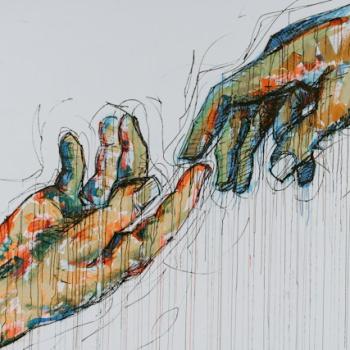At Wednesday’s All Saints’ Day Mass, we celebrated the spiritual G.O.A.T.’s that have “come marching in” throughout the course of Church history. We also heard the call to become saints ourselves. But we all had the same thought, didn’t we?

A saint? Me? No way!
But what if I told you there is one thing you could do, one concrete action you could take, that would catapult you past those identified as “blessed” and “venerable? What if you could jump to the front of the line with those already canonized? Picture yourself up in box seats with the likes of St. Peter and St. Agnes, St. John Paul II and St. Theresa of Calcutta, St. Maximillian Kolbe and St. Josephine Bakhita, and all the rest.
What’s the Catch?
No, this isn’t one of those online scams that makes you watch the entire 49-minute video before offering you the miracle weight-loss solution for the low, low price of just $19.99 for the first three months and just $69.99 per month thereafter. Taxes and fees may vary.
No again, it doesn’t involve being crucified, burned at the stake, stoned, or beheaded. You don’t even have to give everything away to the poor. And no a third time—this one thing necessary for sainthood is not “love everybody,” which is a lovely, pious-sounding, catch-all phrase, but as a guidebook to sainthood is too vague to be of practical use.
Then What?
I think the way to be a saint in the modern world is to engage in one of the most radically human acts there is—to listen. To really and truly listen to another person for the purpose of understanding that person’s truth may be the most astonishing, counter-cultural, subversive act a person can engage in today.
What would happen if two people who fundamentally disagree about important issues truly listened to each other? I don’t mean listening as a way of politely waiting for my next opportunity to speak or as a necessary evil before I can make my next attack in a debate. I mean listening to truly understand where the other person is coming from.
I think saints would probably let go of the need to prove why they’re right and listen to understand what life experiences led the other person to draw such different conclusions. A saint would probably be less interested in “winning” a battle of ideas and more concerned with listening for the other person’s feelings, vulnerabilities, and defenses.
Listening as a Saintly Practice
That kind of listening is rare today. So is asking an “authentic question,” one for which the asker does not already know the answer. I think a saint would ask questions like, “What led you to that conclusion?” or “What life experiences have you had that led you to that viewpoint?” instead of making judgments like, “You don’t understand the real issue here.”
What would happen if people really and truly listened to one another? Dare I suggest sainthood as a logical consequence? Along with a lot less intolerance, violence, and prejudice and a lot more kindness, peace, and justice.
Let’s be honest, though. Listening has levels. My friend and I may passionately disagree about the wisdom of expanding the 12-team College Football Playoff structure, so listening to her viewpoint will be challenging. But don’t cue the marching band version of “The Saints Go Marching In” just yet.
Simple, Not Easy
Could a Jew and a Palestinian living in Gaza truly listen to each other for the purpose of genuinely understanding something of the soul-deep, centuries-long sense of identity that is part of the other person’s every breath and heartbeat? Could the mother of a child killed by a gunman with an AR-15, a mental illness, and a perverted sense of justice actually listen to this murderer on death row?
Ah, there’s the rub. I couldn’t be that mother. And I doubt I could be that Jew or Palestinian. Perhaps giving everything to the poor looks like a walk in the park in comparison. Perhaps this form of authentic listening is its own kind of crucifixion, after all. I said the path to sainthood was simple. I didn’t say it was easy.
Saintly Synodality?
I have followed America Magazine’s Synod Diary over the past month, which has expertly chronicled journalists’ experiences and impressions while covering the Synod on Synodality in Rome. Now that this segment of the synodal process has come to an end, America has also published an article with Fr. James Martin’s first-hand account and an interview with Cardinal Robert McElroy.
I’ll be honest. Like many other progressives, I had hoped for more in the summary document. But I also know that any expectation of any major change from the outset would have been naïve at best. The synod is a consultative, not a deliberative, gathering. Plus, the Church moves in glacial time. Always has. Always will.
Perhaps the biggest take-away for me—and I think for many of the participants from what I have read—is that the focus of the discussions was far less on matters of church doctrine or pastoral practice and far more on listening to understand. Although my own ecclesial wish list may never be satisfied, neither today nor after the next round of synodal discussions that will happen a year from now, I do come away from the last month with some degree of hope.
Reason for Hope
The oldest, largest, most historically complicated, clerically encumbered global organization just convened to work at one thing—authentic listening. If that can happen, maybe I can listen to people who vote differently than I do for the purpose of understanding rather than debating them. Maybe I can ask authentic questions that I don’t already have answers for and welcome rather than attack their responses.
Maybe I could take one simple—but certainly not easy—step toward sainthood. Taxes and fees may vary.












